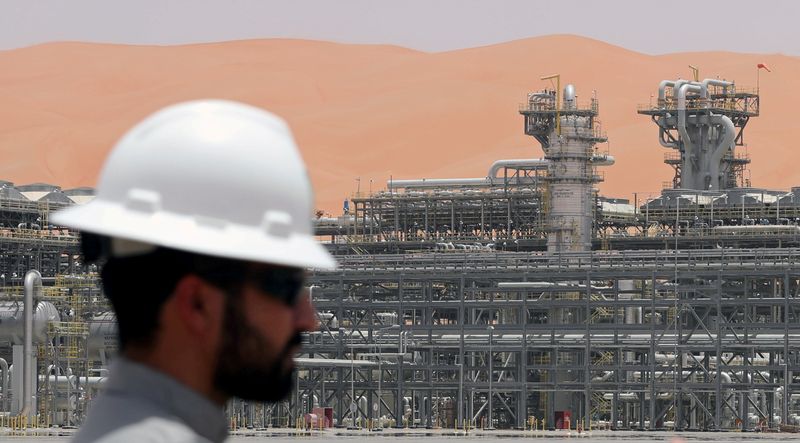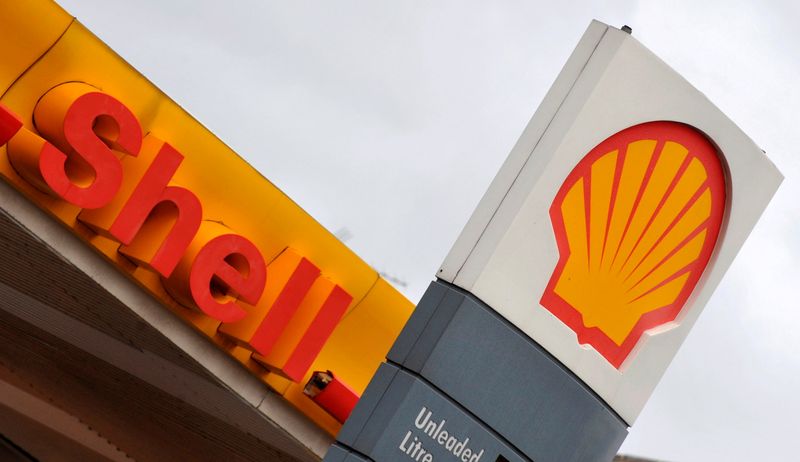By Dmitry Zhdannikov
LONDON (Reuters) -Climate activists who scored big wins against Western majors last week had some unlikely cheerleaders in the oil capitals of Saudi Arabia, Abu Dhabi and Russia.
Defeats in the courtroom and boardroom mean Royal Dutch Shell (LON:RDSa), ExxonMobil and Chevron (NYSE:CVX) are all under pressure to cut carbon emissions faster. That’s good news for the likes of Saudi Arabia’s national oil company Saudi Aramco (SE:2222), Abu Dhabi National Oil Co, and Russia's Gazprom (MCX:GAZP) and Rosneft.
It means more business for them and the Saudi-led Organization of the Petroleum Exporting Countries (OPEC).
"Oil and gas demand is far from peaking and supplies will be needed, but international oil companies will not be allowed to invest in this environment, meaning national oil companies have to step in," said Amrita Sen from consultancy Energy Aspects.
Climate activists scored a major victory with a Dutch court ruling requiring Shell to drastically cut emissions, which in effect means cutting oil and gas output. The company will appeal.
The same day, the top two U.S. oil companies, Exxon Mobil (NYSE:XOM) and Chevron, both lost battles with shareholders who accused them of dragging their feet on climate change.
The International Energy Agency, which looks after the energy policies of the West, issued an appeal last month to the world to essentially scrap all new oil and gas developments. But it gave no clear formula on how to reduce demand.
"It (the IEA report) is a sequel of the La La Land movie. Why should I take it seriously?" Saudi Energy Minister Prince Abdulaziz bin Salman said on Tuesday.
"We (Saudi Arabia) are ... producing oil and gas at low cost and producing renewables. I urge the world to accept this as a reality: that we’re going to be winners of all of these activities," he told an online news conference after a regular OPEC+ meeting.
HOSTILE REGIMES
A high-level executive from Russia's Gazprom said: "It looks like the West will have to rely more on what it calls 'hostile regimes' for its supply".
Saudi Aramco, Adnoc and Gazprom all declined to comment. Oil major Rosneft, in which the Russian state has the biggest stake, also declined to comment.
Western oil majors like Shell have dramatically expanded in the last 50 years, as the West sought to cut its reliance on energy from the volatile Middle East and from Russia.
Those same Western energy majors, including BP (NYSE:BP) and Total, have set out plans to sharply reduce emissions by 2050. But they face growing pressure from investors to do more to meet U.N.-backed targets to limit global warming.
Saudi Aramco, listed on the Saudi bourse but majority state owned, is not under the same sort of pressure to cut its carbon emissions, although the kingdom's rulers aim to sharply increase the country's use of renewables.
Gazprom expects demand for natural gas to grow in coming decades and for it to play a bigger role in energy consumption than renewable sources and hydrogen.
Western oil majors control around 15% of global output, while OPEC and Russia have a share of around 40 percent. That share has been relatively stable in recent decades as rising demand was met with new producers like smaller private U.S. shale firms, which face similar climate-related pressures.
PEAK DIVIDENDS
Since 1990, global oil consumption has grown to 100 million barrels per day from 65 million bpd, with Asia providing the lion's share of growth.
Countries such as China and India have made no pledges to reduce oil consumption, which on a per-capita basis is still a fraction of the levels in the West. China will rely heavily on gas to cut its huge coal consumption.
Despite pressure from activists, investors and banks to cut emissions, Western oil majors are also tasked with maintaining high dividends amid heavy debts. Dividends from oil companies represent significant contributions to pension funds.
"It is vital that the global oil industry aligns its production to the Paris goals," said Nick Stansbury at Legal & General, which manage £1.3 trillion ($1.8 trillion) in assets on behalf of savers, retirees and institutions. "But that must be done in step with policy, changes to the demand side, and the rebuilding of the world’s energy system.
"Forcing one company to do so in the courts may (if it is effective at all) only result in higher prices and foregone profits," Stansbury said. Legal & General, one of the world's largest fund managers, holds assets in most oil majors.

Climate lawsuits have been filed in 52 countries in the past two decades, with 90% of those in the United States and European Union, risk consultancy Verisk (NASDAQ:VRSK) Maplecroft said.
"The same oil and gas will still be produced. Just with lower ESG standards," said an executive from a Middle Eastern producer, who previously worked for an oil major, referring to environmental, social and governance performance measurements.
